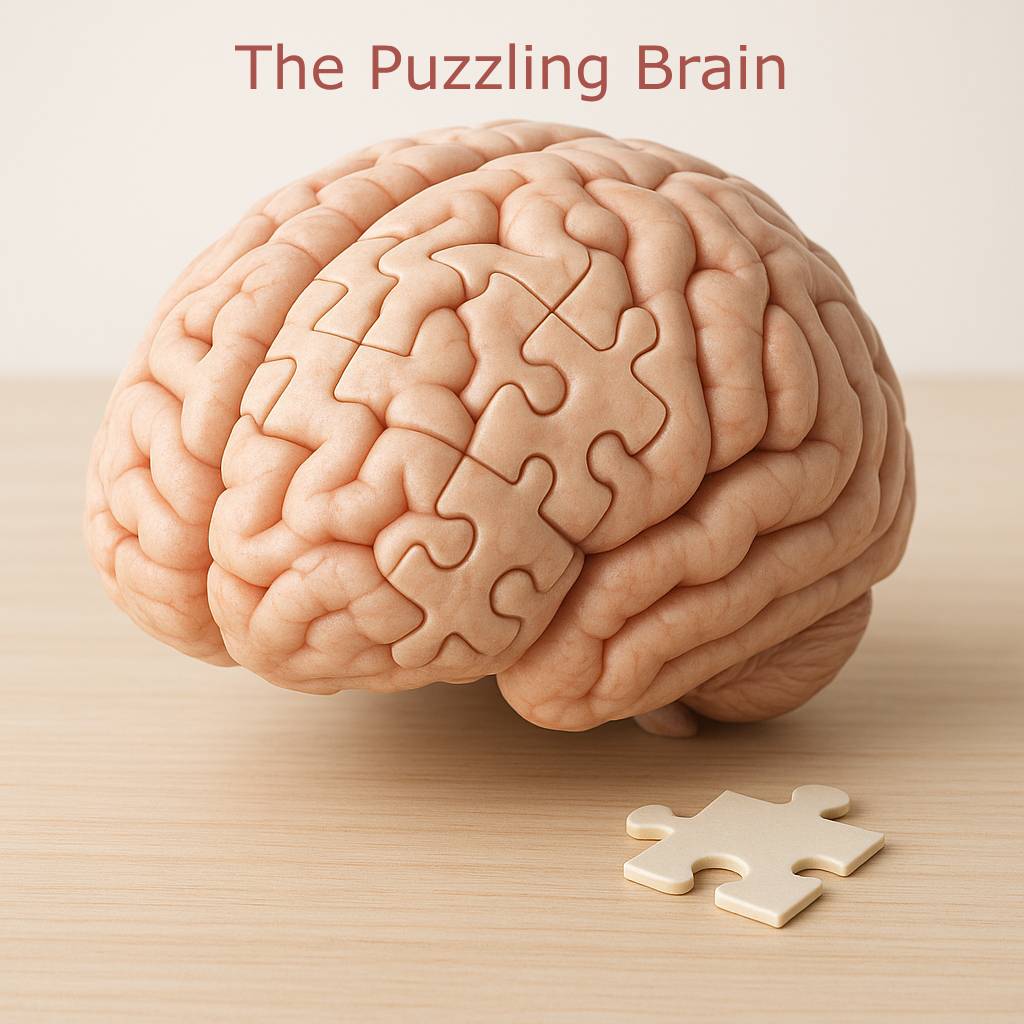I’ve been reflecting lately on the simple delight humans have in making puzzles. It struck me watching my wife the other day, totally absorbed in her daily word puzzle. You see it everywhere—puzzles, games, riddles—humans just love them. Chess, Scrabble, cards, Bridge, Go… these kinds of games have existed across cultures and throughout history. Wherever you look, the human brain lights up at the challenge of solving.
There’s something hardwired about it. The human brain can’t leave a gap. It’s constantly driven to make sense, to fill in blanks, to figure things out. It must come up with a solution. And there’s a particular joy in that process—the dance between knowing and not knowing, the little spark of satisfaction when a puzzle falls into place.
Now, from an Acceptance and Commitment Therapy (ACT) point of view—especially through the lens of Functional Contextualism and Relational Frame Theory (RFT)—this puzzling brain is fascinating to observe. It’s a marvel of nature.
But here’s where it gets really interesting, and where it can become a source of trouble. When we look at human distress—anxiety, stress, feeling stuck—we often see that same puzzling brain kicking into overdrive. The same brilliant engine that lets us enjoy a crossword or a game of chess starts spinning its wheels around life’s problems.
It begins to pattern-match—drawing on past experiences, especially painful or traumatic ones—and looking for similarities in the present. It’s brilliant at spotting patterns, even when they’re only kind of similar. Then, it projects those patterns into the future: What if this happens again? What if it gets worse?
In ACT, we see this as the catastrophising mind—the “don’t be dead” part of the brain, as Russ Harris so neatly puts it. It’s evolutionary, and in many ways, it’s kept us alive. We’re wired to be risk-averse because, from a survival perspective, it’s better to have a brain that spots threats—even imaginary ones—than to miss something real and pay the ultimate price.
So, the puzzling brain is doing exactly what it’s built to do. It works brilliantly—until it doesn’t. When we don’t step back and observe what it’s puzzling over, we can get caught in an endless loop of problem-solving where there’s no actual solution. It’s like working on a jigsaw puzzle where the final piece doesn’t exist, but we keep searching anyway. That’s where we see anxiety, worry, and rumination grow.
RFT helps us make sense of this by showing how the human brain naturally relates things together—past to present, this to that, “me” to “my anxiety,” “future” to “disaster.” It’s constantly weaving a web of meaning. And from a Functional Contextualist view, the question isn’t what thoughts we have, but how those thoughts are working in the moment: are they helping us live a rich, meaningful life—or are they pulling us away from it?
ACT offers us a different relationship with our puzzling brain. Instead of getting lost inside its endless loops, we can step back—notice the puzzle-solving at work—and choose whether or not to engage with it. We develop psychological flexibility: the ability to observe thoughts and feelings, make space for them, and return to what matters most.
I find it beautiful, really. The same brain that gets stuck is also the brain that can stand back and notice it’s stuck. That simple shift—from being the puzzle to watching the puzzle—is transformative. As Jill Stoddard puts it, “You are not your thoughts; you are the thinker of your thoughts.” And that small distance changes everything.
So, the puzzling brain? A wonder of evolution, a double-edged sword. Delightful when it’s playing with games and riddles. Tricky when it’s stuck spinning over life’s hardest questions. But with ACT’s tools—defusion, acceptance, awareness—we learn to relate to it with curiosity and kindness, choosing to step out of the puzzle when it’s no longer serving us.
What Is Acceptance and Commitment Therapy (ACT)?
Acceptance and Commitment Therapy, or ACT (pronounced like the word “act”), is a modern type of behavioural therapy that helps people deal with difficult thoughts and feelings in a healthy way. Instead of fighting or avoiding painful experiences, ACT teaches us to accept them, notice them, and then take committed action towards the life we truly want. It’s all about building psychological flexibility—the skill of staying present, opening up, and doing what matters, even when life is hard.
What Is Relational Frame Theory (RFT)?
Relational Frame Theory is the science that sits underneath ACT. It explains how humans naturally connect things together in their minds—like words, ideas, memories, and meanings. For example, if you hear the word “failure,” your brain might quickly link it to shame, fear, or past mistakes. This linking is automatic. RFT helps us understand how language and thinking can both help us and trap us—especially when we get tangled up in thoughts that don’t serve us well.
What Is Functional Contextualism?
Functional Contextualism is the philosophy behind ACT. In simple terms, it means we look at behaviour in context—what’s happening around us, what’s happening inside us, and what the result of our behaviour is. Instead of asking, “Is this thought true?” ACT asks, “Is this thought helpful right now?” It’s a very practical, real-world approach: focus on what works, in this moment, to help us move toward a meaningful life.
About Bill Stevens at RedChair
Bill Stevens is a therapist and performance coach based in Wilmslow, working through his practice, RedChair. Specialising in addictions, sports psychology, and elite performance, Bill uses Acceptance and Commitment Therapy (ACT) to help people get unstuck and live rich, meaningful lives. His work combines deep empathy with practical strategies, supporting clients in everything from addiction recovery to professional sports and business success. Bill is passionate about sharing ACT in a down-to-earth way that’s easy to understand and apply to real life.

